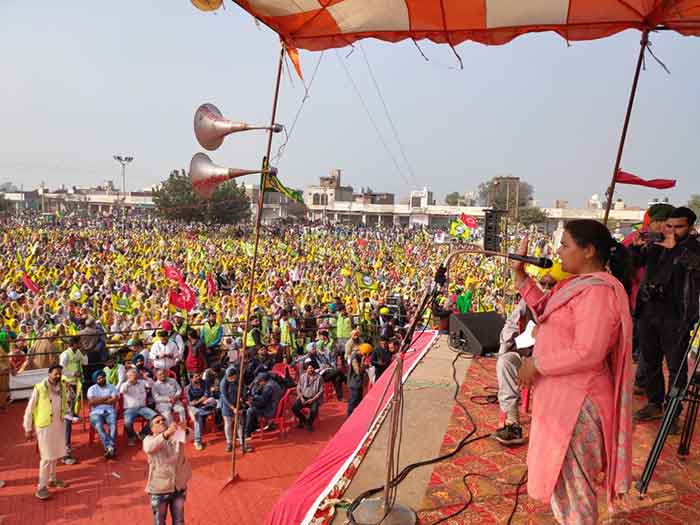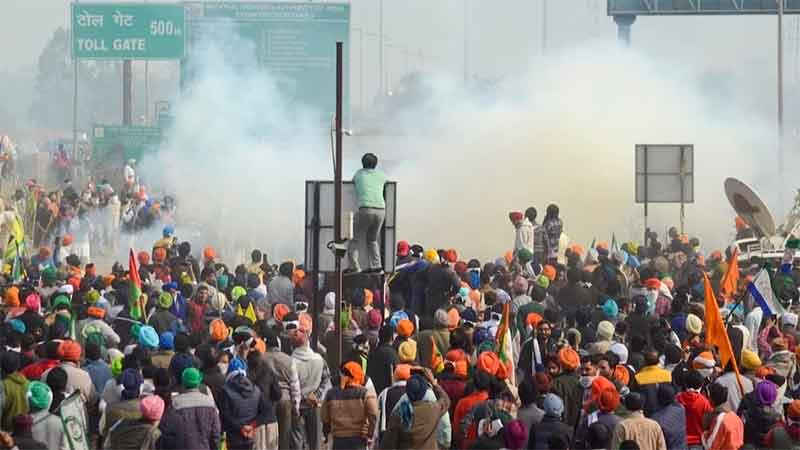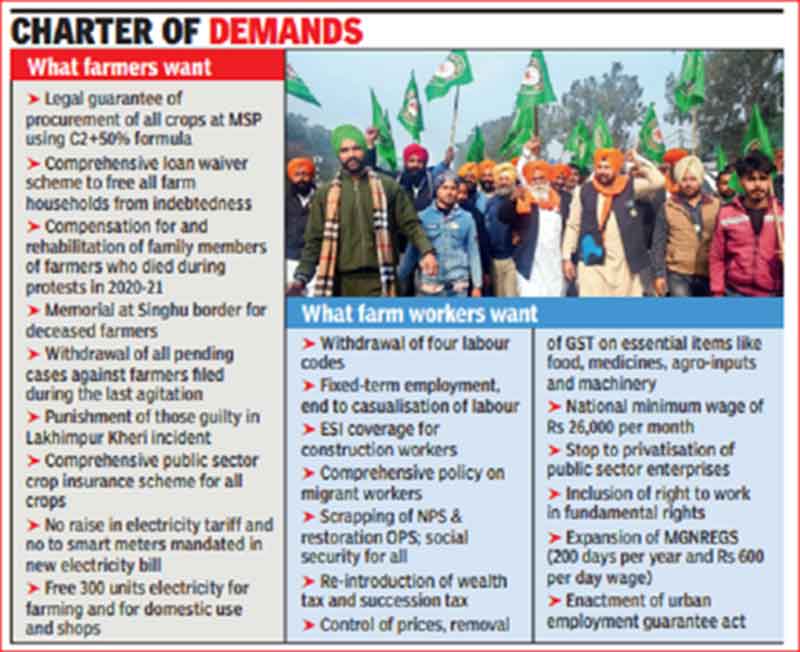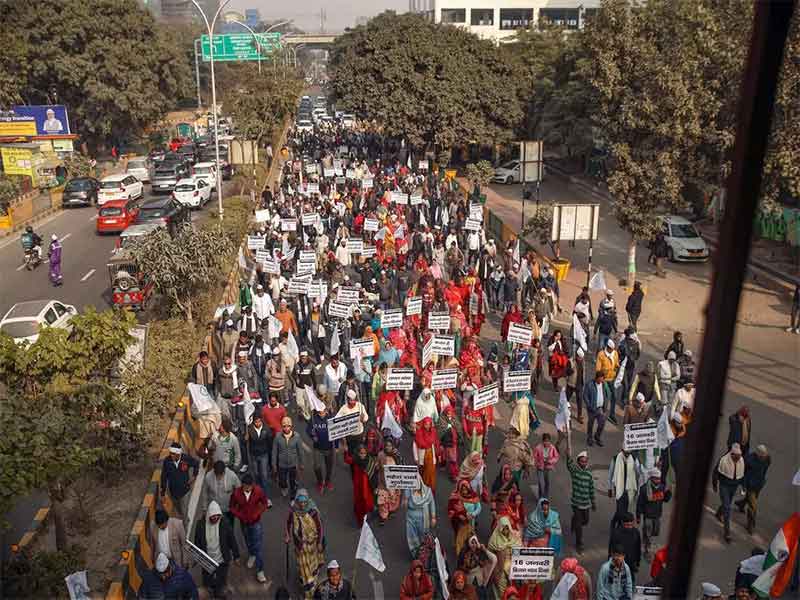
March 5, 2021 marks the 100th Day of the sit-in of more than half a million farmers and workers and it is indeed an unthinkable affair compared to farmers’ movements that happened in the recent past. It will not be irrelevant if we probe a little bit of history to understand its uniqueness.
In the past, we have seen bigger and longer peasants’ struggle. In the late 1940s like the glorious Telangana and Tebhaga movements which continued for years. But, in the 1980s, the revolutionary peasants’ movement subsided or was subsiding (except some flares, e.g., in some districts of undivided Bihar, Andhra and some pockets of Punjab too); whereas various ‘national’ movements were rising — like the Assam movement in Assam from late 1970s, the Jharkand movement, the Punjab movement or Khalistan movement, which based itself at first on the 1973 Ananpur Sahib Resolutions, the Gorkhaland movement, the Boroland movement, etc). From that decade we have been seeing a different kind of Farmers movement. Those movements were led by the capitalist landlords (a good term coined by prof. Utsa Patnaik) and rich peasants and served the interest of these classes and stratum. We saw different kinds of slogans (related to remunerative prices of crops / higher MSP, and lower inputs prices / input-subsidy). We also saw different forms of movement (rasta-roko, rail-roko, along with sit-in/seize/satyagraha etc, naturally which were not like transport workers strike or 1974 railway-strike). All those started in a big way in 1983 Nashik Movement led by Sharad Joshi and then, Mahendra Singh Tikait of BKU carried the baton. Btw, these ‘roko’ forms also entered toiling peoples’ movement as a ‘last resort’ to make the deaf govt. administration hear the voices of workers or for some urgent local demands, for example the Kanpur Cotton Textile workers conducted their famous 5-day rail roko 1989, and we also saw many such rail/road blockades in WB when factory workers suddenly found their factory was locked out. Anyway, under Mahendra Singh Tikait’s leadership we saw very long protests: 77-day Ghaziabad protest in 1992, 1-month seize of Lucknow in the same year, 110 days Rajabpur Satyagraha, to mention a few. Demands were: more compensation for land, cheaper electricity, fertiliser subsidy, higher MSP, loan waiver etc.
This very scrappy and sketchy ‘history’ points to transition of peasant- movement to ‘farmers movement’ mainly in the interest of capitalist landlords and rich peasants, which got increasingly focused to two demands: (1) remunerative prices (Swaminathan Commission recommendation = 150% of cost of production) and (2) Farm Loan Waiver. The very decorative movements of recent years, like the CPIM of AIKS led Nashik to Mumbai Kisan Long March in 2018, the BKU (Tikait) led Kisan Kranti Yatra of 2018, the 2018 Dilli Chalo by Yogendra Yadav led umbrella body AIKSCC, the much-hyped 2017 Tamil Nadu Farmers protest in Delhi by an organisation which supports the crazy idea of River-Linkage, all fall in this category. Why these protests, even the CPIM led Maharashtra Long March also serves interest of capitalist landlords and rich peasants and are UNABLE TO SERVE the interests of poor and middle peasants is a different question and it was dealt with in several articles by this author like “There are ‘farmers’ and farmers” in Countercurrents, Apr 13, 2018, https://countercurrents.org/2018/04/there-are-farmers-and-farmers-a-postscript-to-maharashtra-farmers-long-march/. Everybody of those parties and organisations comfortably forgot the question of increasing wages of agricultural labourers, the question of land to the landless, anti-usury movement and all such ‘old-fashioned’ words that were still in vogue in the 1970s.
But what started mainly in Punjab villages in August-September 2020 and converged to Delhi border points (Singhu and Tikri) on Nov 26, 2020 and their continuing protest for 100 days at a stretch, including a Tractor Rally in Delhi on Jan-26, and which is continuing even after death of more than 260 fighters and arrest of hundreds… is really a unique one. Here, the demand that came in the forefront is repealing the three agriculture laws enacted by the govt, this got more highlight than the demand of MSP as was proved by several rounds of talks between farmer leaders and govt. negotiators. The farmers organisations want nothing short of total repeal of these three agricultural laws.
There are some important points:
(1) These three Agri-laws are not only totally anti-peasant (poor, middle, rich peasants) and anti-farmer (farmer in the sense that who owns and operates/manages a farm depending on labourers), but also against all toiling people, as the Law 3 implementation will increase prices of essential commodities (outside the new govt. definition of essential commodities).
(2) Moreover, the movement to repeal these laws is definitely a movement against corporatisation and also anti-imperialist (by defying the W.B.-I.M.F. dictum for agriculture). No political parties that enjoyed governmental power or vie to enjoy that (including the CPI, CPIM etc lefts parties) cannot and did not do any ‘movement’ in real sense that may hurt interests of foreign and/or desi corporate bodies or foreign and desi capitalists.
(3) ‘Luckily’ the present movement could not be controlled by such political parties; the farmers unions and labourers’ bodies independent of those conceived this movement and are the main driving force of this movement. They are in control of this movement.
(4) Farmers and labourers of many states like Punjab, Haryana, Rajasthan, Western-UP, Uttarakhand now control large farmer-labourer assembled forces at different borders. Of course, there are also some from Maharashtra, but anyway, leaders like Hanna Molla of CPIM or Yogendra Yadav of Swaraj party are not able to dominate or rein in the movement.
(5) BKU (Tikait) and likeminded unions also made this demand, repeal of farm laws, their central demand, and did not insist on focusing Swaminathan Recommendation and loan waiver like they did in their previous movements.
(6) Moreover, this movement could bring some changes in the BKU fractions mainly working in western Uttar Pradesh. For example – Tikait openly confessed that supporting BJP was a big mistake; many Mahapanchayats were organised each attended by thirty to fifty thousand villagers where the leaders promised to distance themselves from BJP; they confessed that making anti-Muslim riot was a very big mistake and they will never do it again; talks of unity cutting across castes and religions were there, the ‘identity’ of toiling people resurfaced, that ‘identity’ for which they can feed themselves, their family members and all non-farm people of the country. It is indeed heartening to see Hindu-Muslim Unity resurfacing at such places in the Yogi-Raj where the soil was blood-stained by notorious anti-Muslim pogroms. Previously we have seen Punjab-Haryana Unity, Sikh-Hindu Unity were forged to smash the govt. plan to divide the movement in the January days. How a struggle can change minds, how a struggle can teach!
One particular farmers’ organisation, the BKU (Ekta Ugrahan) took some extra steps that must be appreciated. For example, in the first phase of the sit-in, they observed one day as ‘Human Rights Day’, and demanded release of all political social activists who are imprisoned with false allegations. Recently they conducted a weeks-long agitation-propaganda explaining to the Punjab toilers how imperialism is linked with these farm laws and why our struggle must be anti-imperialist. They staged a big workers-peasants united rally where more than two-hundred-thousand workers and peasants after weeks of preparation. The farm labourers’ union explained to the workers the need of workers-peasants unity in this and in the future struggles. They could show in some of their programmes that jawan-kisan unity is not just a slogan.
But sadly, and it is the most important point now, the states where the masses of peasants and workers are mainly under the domination of the parliamentary parties and not the so-called ‘independent’ farmers organisation, e.g., Bengal, Andhra, Tamil Nadu, Assam, etc there those parties did not yet take concrete steps for organising masses towards anti-Farm-Acts movement like Punjab and Haryana. They issued only statements in the media. CPIM chief even wrote in his article to make new farm laws after repealing these ones after discussing, even with concerned corporate capitalists! (For example, you may see https://www.frontierweekly.com/views/jan-21/13-1-21-CPIM%20can%20never%20ever%20forget%20their%20Corporate%20friends.html.) It is really a matter of shame for those once connected with revolutionary movement in Bengal that they could also not stir the masses by agitation-propaganda, Bengal did not see any move like boycotting Adani-Ambani shops/pumps including boycotting Ambani’s or Reliance’s JIO as farmers in Punjab did as token gestures against corporatisation of agriculture, the laws, and steps taken by Adani, Ambani etc capitalists. Even Tata is perhaps now eager to take on ‘Big Baskets’ that supply not only grocery products but also fish, meat and etc at doorsteps. The big ‘Brigade Meeting’ on Feb 28 by the alliance of CPIM etc Left parties with Indian National Congress and a new outfit named ISF led by a Pirzada did not raise or emphasise the slogan of repealing the three anti-people farm laws! They did/could not say that if voted to govt. power they would never implement those laws in WB (agriculture being a state subject)!
The onus is now on communist revolutionaries and there are toiling people who want to fight, who are disenchanted with the parliamentary parties. Election results will not and cannot show this. We must clarify to thousands of toiling masses what the three farm laws really mean and what would be the consequences – it is not impossible to do – we must try to do as much as we can. We are to clarify why this matters more than all the electoral speeches, promises and jibes of all parliamentary parties. Why this election campaign cannot evade the birding questions of farm laws and labour laws. We must try to explain that no-vote-to-BJP is NOT the ONLY important slogan now, but there should be agitations by the toiling masses against the farm laws, and these are also very important now – these farm laws and labour laws are concrete deeds of the BJP led govt. against the toilers and for the interest of desi and foreign capitalists We must tell the masses why toiling masses should try to design steps, however small, against these farm laws, why toiling people should not put any faith in parliamentary parties.
There is another encouraging sign: We are seeing many environmental activists are up in arms over the farm laws. It started not from the Greta tweet as the media reported. Much back, several environmental activists and organisations, who were against the severe damage caused by the imperialist-sponsored Green revolution, studied the farm laws and saw in those again an attempt to develop the Indian part of global-food-production chain led by the big imperialist multinational corporate bodies and their Indian counterparts. They understood how anti people and anti nature will be the effects of these laws. They have already started to take programs on their own to conduct agitation-propaganda among the toiling people and also among the intelligentsia. We need to cooperate as much as possible keeping in mind many constraints (like disenchantment of many environmentalists regarding practices of ‘communist countries’ etc). At this moment, joining forces against the farm laws may be given priority.
Sandeep Banerjee is an activist who writes on political and socioeconomic issues and also on environmental issues. Some of his articles are published in Frontier Weekly. He lives in West Bengal, India. Presently he is a research worker. He can be reached at [email protected]
GET COUNTERCURRENTS DAILY NEWSLETTER STRAIGHT TO YOUR INBOX














































